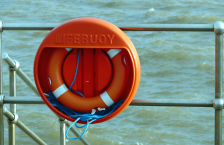A step-by-step guide to avoid sea accidents
The summer is here and it appears that everybody with a boat, board or ski (PWC) is heading to the coast for fun in the sun making it the perfect time to get some sea survival training.
As the motorways stack up and coastal resorts swell in population, spare a thought for our emergency services. They are often called upon to pick up the pieces when things go wrong.
Taking responsibility for equipment and sea safety must be taken seriously, before you set off to your destination. You should make sure that roof racks and straps are correctly fixed and adjusted tightly so boards, luggage or equipment is not lost on route.
And if you are towing, ensure that the trailer is ready for the road! Far too many incidents occur every summer because of poor planning and maintenance. Taking responsibility for your safety doesn’t stop when you have arrived at the beach.
Again planning and preparation for the activities you enjoy can make the difference between being prepared, or being another rescue static for the emergency services to deal with.
My advice to all seafarers is to get sea survival training. Courses for activities on the sea from the National Governing Bodies are highly recommended. These courses will give you the skills and the knowledge to make informed decisions on how, when and where it is safe to operate and participate.
With thousands of people enjoying the coastline every summer our lifeguards, coastguards and other emergency services are performing rescues daily. Most of which could have been avoided with some training and common sense.
Educating the public to ensure they look after themselves is not always easy. Signage, warning flags and local advice is often ignored or miss-understood. Having worked in the maritime industry for over 30 years, teaching rescue techniques, sea safety and National Governing Body courses in a variety of different disciplines and environments I have seen first-hand what can happen when something goes wrong.
I have also worked on a number of cases including sea accidents through the Institute of Expert Witnesses and as an institute we have pretty well seen it all.
Through these cases we have found on the balance of probabilities it is the lack of training and experience or the total disregard to planning that contributes to the things going horribly wrong. The sea is unforgiving and conditions can change quickly without warning. It is a different environment to inland water activities, as the so-called Inland Navy have found out to their cost when caught out by the tide and weather conditions.
The bottom line is as follows:
- When operating a boat, board, or ski: get training.
- Always use a kill cord on a motor vessel, master the basic skills, keep the vessel and accessories (including trailer) well maintained, check your communication equipment regularly, ensure the vessel has all the sea safety equipment for the activity, conditions and environment it’s going to be used in. Don’t forget personal protective equipment.
- Plan the day and follow the plan. Use check lists as it stops simple mistakes being made.
- Wear life jackets or buoyancy aids that are appropriate for the activity and conditions.
- Check the weather, tides, and get local advice and knowledge before going afloat in a new place or area.
- Be aware of the limitations of your vessel and crew.
- Check your fuel and use the rules of thirds.
- Tell someone on shore what your plans are, where you are going and when you plan to return - let them know when you are safely back!
- Have an emergency contingency plan and share it with everyone participating before you start.
Following these simple sea safety tips will save lives, damages and claims. Not forgetting risking the lives of the teams sent to pick up the pieces from the emergency services.
If you have any questions sea survival training or if you are involved in a sea accident or case, please do not hesitate to contact our Expert Witnesses on 0117 986 2194 or at enquiries@iew.org.uk.
